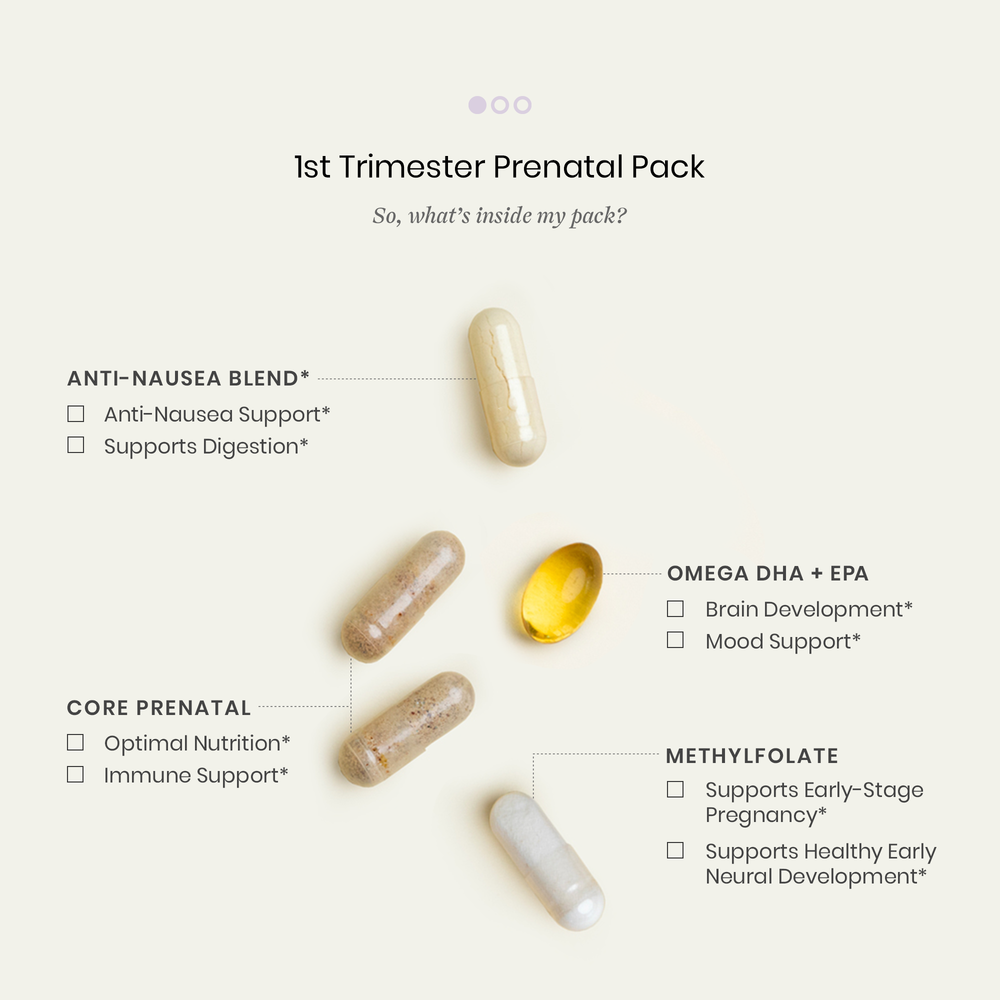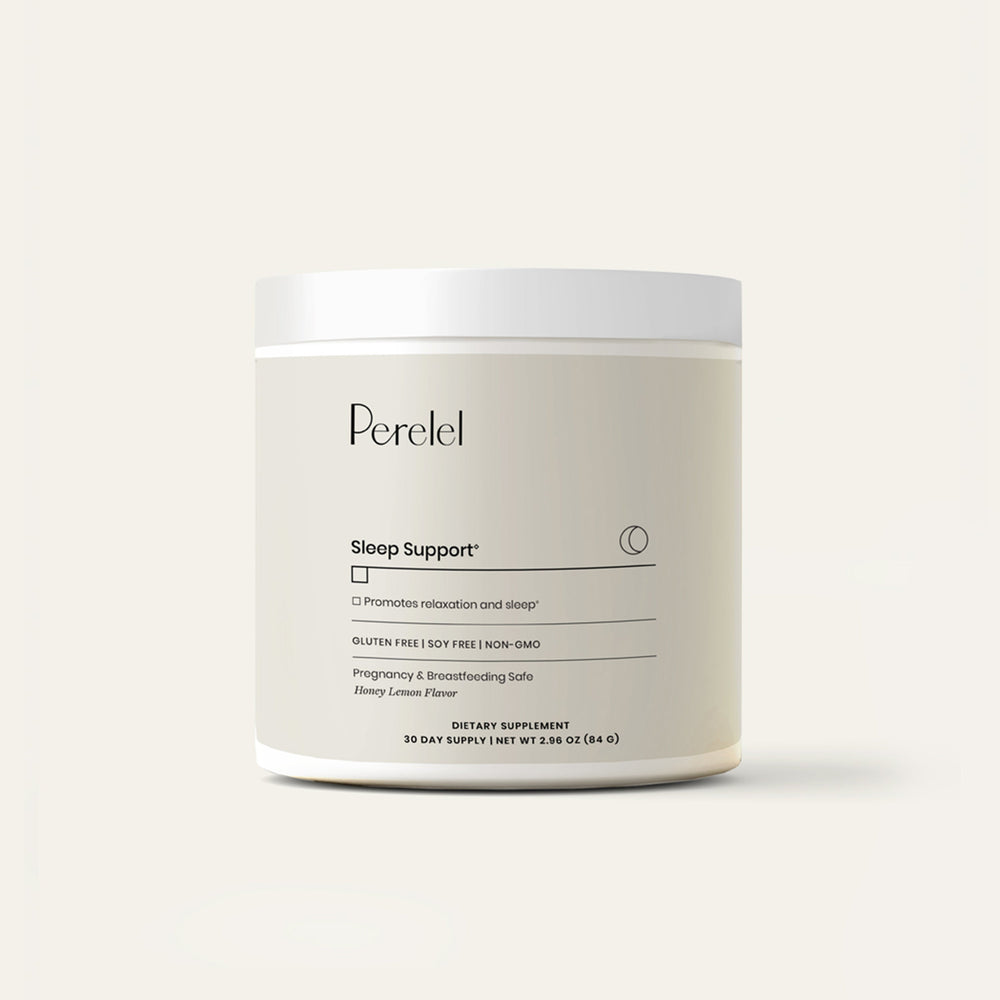How well do you know the nutrient magnesium? This mineral isn't just a buzzy ingredient to help your mind and body unwind—it also plays a series of crucial roles in your daily health. So, what's the best way to get your magnesium intake? (And how does it actually stack up against melatonin as a sleep aid?) Here is everything you need to know about magnesium.
What is magnesium?
Magnesium is the fourth most abundant mineral in the human body.
1 It plays a critical role in protein, bone and DNA synthesis, muscle and nerve function, blood sugar control and blood pressure management, to name a few.
Magnesium is naturally present in many foods, and is sometimes added to fortified foods. Legumes, nuts seeds, whole grains and green leafy vegetables like spinach are all great sources. Dairy products like milk and yogurt, and fortified breakfast cereals also contain magnesium. That said, certain life stages require more magnesium intake, and getting enough magnesium through food alone isn't always a possibility—which is where supplementing magnesium via
a daily multivitamin can come in handy.
What are the benefits of magnesium?
Research suggests that magnesium offers a slew of health benefits. Here are 10 of them:
1. It may lead to sounder slumbers.
Studies show that taking magnesium supplements may help reduce the amount of time it takes to fall asleep and decrease the likelihood of falling asleep during the day.2 Research also suggests that increasing your intake of magnesium may help improve your sleep quality and duration.3
It's why we use a research-backed magnesium blend in our
Sleep Support—the doctors behind our formula very intentionally chose magnesium over melatonin, since melatonin is the hormone our brain produces to induce sleepiness. Taking more melatonin can directly impact our sleep-wake cycle, which can lead to grogginess and other undesirable side effects. Instead, studies suggest that magnesium acts as a precursor for our natural melatonin production, relaxing the body and setting the stage for better sleep. In other words, taking magnesium may help our bodies do what they do best.
2. It may help your heart.
Research suggests that taking magnesium supplements may help improve several risk factors for heart disease, including triglyceride, LDL cholesterol (the bad kind), HDL cholesterol (the good kind), and systolic blood pressure levels, particularly in those with a magnesium deficiency.
4
While these findings are encouraging, more research is warranted since other studies have demonstrated no impact of magnesium on heart health.
2. It may help minimize migraines.
Studies show that taking magnesium supplements may be an effective
approach for preventing and treating migraines. Other research shows that they may alleviate acute migraine attacks more quickly and effectively than a commonly used migraine medication.5
3. It might give your bones a boost.
Magnesium is a critical component of bone—50 to 60 percent of the magnesium in your body is concentrated in your bone.6 And studies reveal that high magnesium intake is associated with increased bone mineral density in the hip and femoral neck, two parts of the body that are
especially vulnerable to fractures. Other research suggests that lower levels of magnesium are linked to greater risk of osteoporosis.7
4. It may support mental health.
Low levels of magnesium have been linked to depression.8 In an analysis of data from nearly 9,000 people, those with the lowest intake had a 22 percent greater risk of depression. It makes sense then that supplementing with magnesium may help reduce symptoms in those with a deficiency.9 Interestingly, one study demonstrated a decrease in symptoms of depression and anxiety in people who supplemented with magnesium—whether they were deficient or not.10
5. It may help with blood sugar management.
Higher intake of magnesium is associated with a reduced risk of developing type 2 diabetes.11 Magnesium supplements have been shown to enhance insulin sensitivity, which is a critical component of blood sugar control.12 Magnesium has also been shown to improve blood sugar levels in people at risk of developing type 2 diabetes.13
6. It may have anti-inflammatory benefits.
Too much inflammation in the body is linked to heart disease and other health conditions.14 Studies show that low magnesium levels are associated with increased inflammation in the body,15 and magnesium supplements may reduce markers of inflammation 16 like C-reactive protein (CRP) and interleukin.
7. It may reduce PMS symptoms.
Some research suggests that taking magnesium supplements may help reduce premenstrual syndrome (PMS), menstrual cramps and menstrual migraines,
17 although more research is needed to determine the impact on women with varying levels of magnesium already in their bodies. (For what it's worth, we include 25mg of magnesium in our
Cycle Support Pack*.)
8. It may make you a workout warrior.
Magnesium helps shuttle blood sugar to your muscles and also dispose of fatigue-causing lactate,18 which is especially important if you live an active lifestyle.
Research suggests that magnesium can help enhance athletic performance—in one study, taking magnesium supplements was especially effective in improving exercise performance in older adults and those with a magnesium deficiency.19 Other research demonstrates that magnesium supplementation is an effective way to protect against muscle damage in professional cyclists and improve jumping and arm movements in volleyball players.
Although these findings are encouraging, more research on the relationship between magnesium supplementation and athletic performance is warranted since some research suggests that supplementing doesn’t help athletes or active individuals who have normal magnesium levels.
10. It could have anxiety-reducing effects.
Studies show that being deficient in magnesium may make your body more vulnerable to stress and as a result, exacerbate anxiety symptoms.20 For those suffering from anxiety, magnesium may provide relief—some research shows that it can help treat and prevent both anxiety and depression.21
Are there any side effects to magnesium?
Magnesium in food and beverages does not pose any health risks, and intake from these sources does not need to be monitored. But supplements and medications containing magnesium should not be consumed in amounts above the upper limit—that's 350 mg for adults—unless recommended by a healthcare provider.
How much magnesium is recommended for an adult?
The requirements your body has for magnesium depend on your age and gender. Adult men should aim for 400 to 420 milligrams (mg). Adult women should strive for a magnesium intake of 310 to 320 mg. Pregnant women need more (350 to 360 mg) as do breastfeeding mamas (310 to 320 mg).

Which type of magnesium should I take?
According to the Dietary Guidelines for Americans, you should strive to get most of your nutrients from food and beverages since these contain a variety of vitamins and minerals, plus nutrients like fiber, which provide health benefits. But if you’re at risk of deficiencies, or you’re in a specific life stage that necessitates higher intake (think pregnancy and lactation), supplements can help ensure adequate intake. It's why our experts opted to include slightly more magnesium in our Trimester Packs and Mom Multi Support Pack—and even added additional magnesium (200 mg) and calcium in our 2nd Trimester Pack, since we tend to be more prone to muscle cramping in the second trimester.
As always, remember to check in with your healthcare provider before changing your supplement routine.
Ready to add magnesium to your daily routine? Shop doctor-made vitamins for your exact stage now.
This article is for informational purposes only. It is not, nor is it intended to be, a substitute for professional medical advice, diagnosis, or treatment and we recommend that you always consult with your healthcare provider. To the extent that this article features the advice of physicians or medical practitioners, the views expressed are the views of the cited expert and do not necessarily represent the views of Perelel.
Resources:
1 Magnesium Fact Sheet: National Institutes of Health
2 Arab A, Rafie N, Amani R, Shirani F. The Role of Magnesium in Sleep Health: a Systematic Review of Available Literature. Biol Trace Elem Res. 2023 Jan;201(1):121-128. doi: 10.1007/s12011-022-03162-1. Epub 2022 Feb 19. PMID: 35184264.
3 Brown GM. Light, melatonin and the sleep-wake cycle. J Psychiatry Neurosci. 1994 Nov;19(5):345-53. PMID: 7803368; PMCID: PMC1188623.
4 Verma, H. and Garg, R., 2022. Effect of magnesium supplementation on type 2 diabetes associated cardiovascular risk factors: a systematic review and meta-analysis.
5Shahrami, A., Assarzadegan, F., Hatamabadi, H., Asgarzadeh, M., Sarehbandi, B. and Asgarzadeh, S., 2022. Comparison of Therapeutic Effects of Magnesium Sulfate vs. Dexamethasone/Metoclopramide on Alleviating Acute Migraine Headache.
6 Ods.od.nih.gov. 2022. Office of Dietary Supplements - Magnesium.
Available at: <https://ods.od.nih.gov/factsheets/Magnesium-HealthProfessional/>
7 Rondanelli M, Faliva MA, Tartara A, Gasparri C, Perna S, Infantino V, Riva A, Petrangolini G, Peroni G. An update on magnesium and bone health. Biometals. 2021 Aug;34(4):715-736. doi: 10.1007/s10534-021-00305-0. Epub 2021 May 6. PMID: 33959846; PMCID: PMC8313472.
8 Rajizadeh A, Mozaffari-Khosravi H, Yassini-Ardakani M, Dehghani A. Effect of magnesium supplementation on depression status in depressed patients with magnesium deficiency: A randomized, double-blind, placebo-controlled trial. Nutrition. 2017;35:56-60. doi:10.1016/j.nut.2016.10.014
9 Tarleton EK, Littenberg B, MacLean CD, Kennedy AG, Daley C. Role of magnesium supplementation in the treatment of depression: A randomized clinical trial.
10 Hruby, Adela, et al. “Magnesium Intake, Quality of Carbohydrates, and Risk of Type 2 Diabetes: Results from Three U.S. Cohorts.” Diabetes Care, vol. 40, no. 12, 1 Dec. 2017, pp. 1695–1702, pubmed.ncbi.nlm.nih.gov/28978672/, 10.2337/dc17-1143.
11 Simental-Mendía, Luis E., et al. “A Systematic Review and Meta-Analysis of Randomized Controlled Trials on the Effects of Magnesium Supplementation on Insulin Sensitivity and Glucose Control.” Pharmacological Research, vol. 111, Sept. 2016, pp. 272–282, 10.1016/j.phrs.2016.06.019.
12 Simental-Mendía, Luis E., et al. “A Systematic Review and Meta-Analysis of Randomized Controlled Trials on the Effects of Magnesium Supplementation on Insulin Sensitivity and Glucose Control.” Pharmacological Research, vol. 111, Sept. 2016, pp. 272–282, 10.1016/j.phrs.2016.06.019.
13 “Could Your Food Be Making You Ill?” Heart Foundation NZ, www.heartfoundation.org.nz/about-us/news/blogs/food-and-inflammation.
14 Nielsen, Forrest H. “Magnesium Deficiency and Increased Inflammation: Current Perspectives.” Journal of Inflammation Research, vol. 11, 18 Jan. 2018, pp. 25–34
15 Simental-Mendia, Luis E., et al. “Effect of Magnesium Supplementation on Plasma C-Reactive Protein Concentrations: A Systematic Review and Meta-Analysis of Randomized Controlled Trials.” Current Pharmaceutical Design,
16 Ebrahimi, Elham, et al. “Effects of Magnesium and Vitamin B6 on the Severity of Premenstrual Syndrome Symptoms.” Journal of Caring Sciences, vol. 2012, no. 4, pp. 183–189, www.ncbi.nlm.nih.gov/pmc/articles/PMC4161081/pdf/jcs-1-183.pdf, 10.5681/jcs.2012.026.
17 Zhang, Yijia, et al. “Can Magnesium Enhance Exercise Performance?” Nutrients, vol. 9, no. 9, 28 Aug. 2017, p. 946, www.mdpi.com/2072-6643/9/9/946/htm, 10.3390/nu9090946.
18 Wang, Ru, et al. “The Effect of Magnesium Supplementation on Muscle Fitness: A Meta-Analysis and Systematic Review.” Magnesium Research, vol. 30, no. 4, Oct. 2017, pp. 120–132, 10.1684/mrh.2018.0430.
19 Córdova, Alfredo, et al. “Impact of Magnesium Supplementation in Muscle Damage of Professional Cyclists Competing in a Stage Race.” Nutrients, vol. 11, no. 8, 16 Aug. 2019, www.ncbi.nlm.nih.gov/pmc/articles/PMC6723322/#B14-nutrients-11-01927, 10.3390/nu11081927.
20 Pickering, Gisèle, et al. “Magnesium Status and Stress: The Vicious Circle Concept Revisited.” Nutrients, vol. 12, no. 12, 28 Nov. 2020, p. 3672, www.ncbi.nlm.nih.gov/pmc/articles/PMC7761127/, 10.3390/nu12123672.
21 Boyle, Neil Bernard, et al. “The Effects of Magnesium Supplementation on Subjective Anxiety.” Magnesium Research, vol. 29, no. 3, 1 Mar. 2016, pp. 120–125, pubmed.ncbi.nlm.nih.gov/27869100/, 10.1684/mrh.2016.0411.









